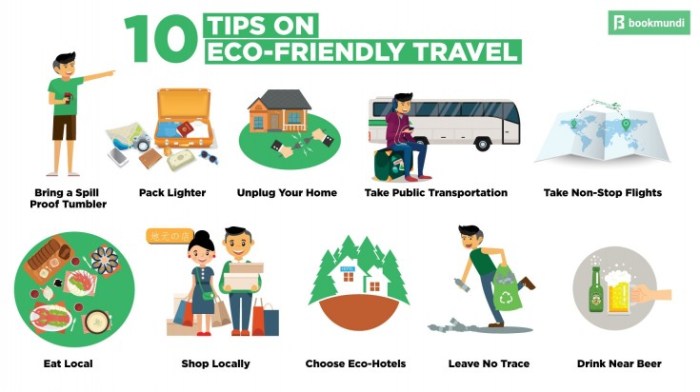Embark on a transformative journey with our eco-friendly travel tips, empowering you to explore the world while minimizing your environmental footprint. Discover sustainable transportation options, eco-conscious accommodations, and responsible activities that preserve the beauty of our planet for generations to come.
Transportation

Transportation is a major contributor to greenhouse gas emissions, which are the leading cause of climate change. Choosing eco-friendly transportation options can significantly reduce your carbon footprint and help protect the environment.
To minimize your environmental impact while traveling, consider eco-friendly practices such as using reusable water bottles and choosing sustainable accommodations. If you’re seeking pristine shores, the best beaches in the Caribbean offer breathtaking landscapes. Remember to pack reef-safe sunscreen and avoid single-use plastics to preserve these delicate ecosystems.
The environmental impact of different transportation modes varies depending on factors such as fuel efficiency, emissions, and occupancy. Trains and buses are generally more eco-friendly than cars, as they can transport more people per trip and produce fewer emissions.
Choosing Sustainable Transportation
- Consider public transportation. Trains and buses are more fuel-efficient than cars and produce fewer emissions. They also help reduce traffic congestion, which can improve air quality.
- Walk or bike. Walking and biking are great ways to get exercise and reduce your carbon footprint. They are also good options for short trips.
- Choose fuel-efficient vehicles. If you must drive, choose a fuel-efficient vehicle. Hybrid and electric cars produce fewer emissions than gasoline-powered cars.
- Carpool or vanpool. Sharing a ride with others can help reduce traffic congestion and emissions.
Accommodation: Eco-friendly Travel Tips

Choosing eco-friendly accommodations can significantly reduce your environmental impact while traveling. Eco-certified hotels and guesthouses prioritize sustainable practices, reducing waste, conserving energy, and protecting the local environment.
Criteria for Eco-Friendly Accommodations
* Energy efficiency: Energy-saving appliances, LED lighting, and renewable energy sources
* Water conservation: Low-flow fixtures, rainwater harvesting, and drought-tolerant landscaping
* Waste reduction: Recycling programs, compost bins, and reusable amenities
* Sustainable building materials: Recycled materials, locally sourced wood, and non-toxic paints
* Environmental management: Staff training, guest education, and community involvement
Benefits of Staying in Eco-Friendly Accommodations
* Reduced carbon footprint: Eco-friendly accommodations prioritize energy efficiency and renewable energy sources, reducing greenhouse gas emissions.
* Water conservation: By conserving water, you can help protect local water resources and reduce the strain on ecosystems.
* Waste reduction: Eco-friendly accommodations minimize waste through recycling, composting, and using reusable amenities, reducing landfill waste.
* Support for local communities: Many eco-friendly accommodations support local businesses and use sustainable practices that benefit the surrounding community.
* Enhanced guest experience: Eco-friendly accommodations often offer unique experiences, such as guided nature walks or educational programs, that connect guests with the local environment.
Activities

Eco-friendly activities allow travelers to explore destinations while minimizing their environmental impact. Opting for sustainable tours and nature-based experiences not only benefits the environment but also supports local communities.
Choosing Sustainable Activities
When selecting activities, consider the following factors:
- Environmental Impact: Choose activities that have minimal impact on the environment, such as wildlife safaris that respect animal welfare or nature walks that promote conservation.
- Community Involvement: Support activities that engage local communities and contribute to their economic well-being.
- Educational Value: Select activities that offer opportunities for learning about the environment and local culture.
Minimizing Environmental Impact During Activities
During activities, take steps to reduce your environmental footprint:
- Pack Light: Minimize luggage to reduce transportation emissions.
- Use Reusable Items: Bring reusable water bottles, bags, and utensils to avoid single-use plastics.
- Respect Wildlife: Observe wildlife from a distance and avoid disturbing their habitats.
- Stay on Designated Trails: Stick to marked trails to prevent erosion and protect vegetation.
- Dispose of Waste Properly: Carry out all trash and dispose of it in designated bins.
Food and Drinks
When traveling, supporting local, organic, and sustainable food and drink businesses is crucial for reducing your environmental impact. Eating locally and sustainably not only reduces greenhouse gas emissions associated with food transportation but also supports local economies and preserves traditional food cultures.
Finding Sustainable Food Options
To find sustainable food options, look for restaurants and markets that prioritize local ingredients, organic farming practices, and waste reduction. Consider joining food cooperatives or community-supported agriculture (CSA) programs, which connect you directly with local farmers.
Embracing eco-friendly travel practices not only reduces your environmental impact but also enhances your travel experiences. While exploring scuba diving locations , consider using reef-safe sunscreen, avoiding single-use plastics, and supporting local conservation efforts. By incorporating these tips into your travel plans, you’ll contribute to preserving the pristine beauty of these underwater wonders for future generations.
Environmental Benefits of Eating Locally and Sustainably
- Reduced greenhouse gas emissions from food transportation
- Support for local economies and preservation of food cultures
- Protection of biodiversity and ecosystem health
Reducing Food Waste
Reducing food waste is essential for sustainable travel. Avoid over-ordering and consider sharing meals. Choose reusable containers and utensils to minimize single-use plastics. Support restaurants that offer composting or food donation programs.
Packing and Essentials
Eco-friendly packing is essential for minimizing your environmental impact while traveling. Here’s a checklist of eco-friendly packing essentials and tips to help you reduce waste and make your trip more sustainable.
Reusable Water Bottle, Eco-friendly travel tips
Disposable plastic water bottles are a major source of waste. Instead, invest in a reusable water bottle and refill it throughout your trip. Choose a durable bottle made from materials like stainless steel, glass, or BPA-free plastic.
Biodegradable Toiletries
Conventional toiletries often contain harsh chemicals that can harm the environment. Opt for biodegradable and eco-friendly toiletries instead. Look for products with natural ingredients and packaging made from recycled or sustainable materials.
Travel-Size Containers
Avoid bringing full-size toiletries that you may not use up during your trip. Instead, transfer small amounts into travel-size containers to reduce waste and save space.
Solid Toiletries
Solid toiletries, such as shampoo bars and deodorant sticks, are a great way to reduce plastic waste. They’re compact, easy to pack, and typically more concentrated than liquid products.
Reusable Straws and Utensils
Plastic straws and utensils are single-use items that contribute to pollution. Bring your own reusable straws and utensils made from bamboo, stainless steel, or other sustainable materials.
When embarking on an eco-friendly getaway, consider the accommodations you choose. Family-friendly resorts can offer a balance of environmental consciousness and amenities for young travelers. Look for resorts that prioritize sustainable practices, such as using renewable energy sources, implementing water conservation measures, and offering eco-friendly activities.
By choosing accommodations that align with your eco-friendly values, you can minimize your environmental impact while creating lasting memories with your loved ones.
Eco-Friendly Laundry Detergent
If you need to do laundry during your trip, choose an eco-friendly laundry detergent that’s biodegradable and free from harmful chemicals.
Reduce Paper Waste
Instead of printing out travel documents and maps, store them on your phone or tablet. Use a reusable notebook for journaling and note-taking.
Avoid Excess Packaging
When packing, avoid products with excessive packaging. Choose items with minimal or recyclable packaging, or consider purchasing items in bulk and repackaging them into reusable containers.
Travel Mindset

Adopting an eco-conscious mindset while traveling is crucial for preserving the environment and promoting sustainability. Travelers can significantly reduce their environmental footprint by making informed choices and adopting responsible practices.
Role of Travelers in Sustainability
Travelers play a vital role in promoting sustainability. By choosing eco-friendly options, they can support local businesses committed to environmental conservation and encourage the adoption of sustainable practices in the tourism industry.
Closing Summary
As conscious travelers, we have the power to make a positive impact on the destinations we visit. By adopting these eco-friendly practices, you can create lasting memories while safeguarding the well-being of our planet and its diverse ecosystems.
Answers to Common Questions
What are the most eco-friendly modes of transportation?
Trains and buses have a lower carbon footprint than cars and airplanes. Consider hybrid or electric vehicles for road trips.
How can I find eco-friendly accommodations?
Look for eco-certified hotels and guesthouses that prioritize energy efficiency, water conservation, and waste reduction.
What should I consider when choosing activities?
Opt for wildlife safaris and nature walks that support conservation efforts and minimize disturbance to wildlife.
How can I reduce food waste while traveling?
Pack reusable containers, buy local produce, and support restaurants that prioritize sustainable practices.
What are some eco-friendly packing essentials?
Include a reusable water bottle, biodegradable toiletries, and a reusable shopping bag to minimize plastic waste.